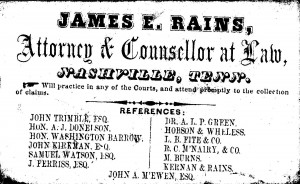 No doubt Steve Jobs’ career will long be studied in business schools. His vision and iconoclastic style changed everything in the world of technology and business. Jobs urged the world to “Think Different” and his accomplishments proved this to be good advice.
No doubt Steve Jobs’ career will long be studied in business schools. His vision and iconoclastic style changed everything in the world of technology and business. Jobs urged the world to “Think Different” and his accomplishments proved this to be good advice.
His career also provided several lessons in marketing for lawyers, as Larry Bodine ably points out. I believe Jobs’ greatest lesson, however, was in the way he lived his life.
Well before illness reminded him of his mortality, Jobs’ philosophy for living drove him to take risks. In his address to the 2005 Stanford graduating class, he described it this way:
“When I was 17, I read a quote that went something like: “If you live each day as if it was your last, someday you’ll most certainly be right.†It made an impression on me, and since then, for the past 33 years, I have looked in the mirror every morning and asked myself: “If today were the last day of my life, would I want to do what I am about to do today?†And whenever the answer has been “No†for too many days in a row, I know I need to change something.
“Remembering that I’ll be dead soon is the most important tool I’ve ever encountered to help me make the big choices in life. Because almost everything — all external expectations, all pride, all fear of embarrassment or failure — these things just fall away in the face of death, leaving only what is truly important. Remembering that you are going to die is the best way I know to avoid the trap of thinking you have something to lose. You are already naked. There is no reason not to follow your heart.â€
Of course this is not, per se, a marketing lesson, nor is it confined to lawyers. But I believe that more than anyone, lawyers need to hear this message.
Lawyers are among the most risk adverse creatures on Earth. Protecting our clients from risk is one of our strengths. Paradoxically, it is also one of our weaknesses.
In the world of business, lawyers are known as “deal breakers”. To protect our clients, (and ourselves), we often overstate the likelihood and potential consequences of perceived risks, often to the detriment of our clients’ business interests. A deal not struck cannot result in loss but neither can it result in gain.
In marketing their services, many lawyers are also deal breakers. They don’t want to appear weak or unprofessional or make a mistake that embarrasses them or gets flagged as an ethics violation, and so too often, they do nothing. Or they do something that is so watered down, so colorless, the results aren’t even worth mentioning.
Steve Jobs was successful because he took chances. He defied convention. He stuck his neck out and challenged the world to a duel. He had many defeats and many detractors but he accomplished great things because he didn’t worry about what others thought.
Most lawyers don’t like marketing, not because they feel it is beneath them, although that sentiment also exists, but because they are afraid to fail. They can sell their ideas to a jury, risking everything on behalf of their client, and when they lose, shrug it off and bounce right back. But when it comes to selling themselves, many lawyers freeze in their tracks.
Learning how to market ones services helps to reduce the fear, but in the end, lawyers need to just go for it. As Los Angeles Dodgers great Maury Wills, who stole 104 bases in one season once said, “You can’t steal second base while keeping one foot on first base.”
While many baseball fans know about Wills’ record setting base stealing, they may not know that he also set a record for being thrown out while attempting to steal a base–31 times during the 1965 season.
Nobody ever achieved great success by playing it safe. All great achievements have come from taking great risks. Steve Jobs took risks every day and lived every day like it was his last. He had many losses and many wins but, I am sure, few regrets.









